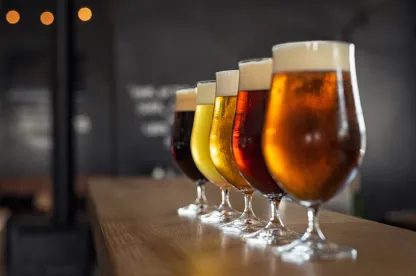The US Court of Appeals for the Seventh Circuit held that a brewing company’s statements that a competitor’s beers were made with corn syrup were not false and misleading under the Lanham Act because the competitor listed corn syrup as an ingredient in its beers. Molson Coors Beverage Co. USA LLC v. Anheuser-Busch Cos., LLC, Case Nos. 19-2200, -2713, -2782, -3097, -3116 (7th Cir. May 1, 2020) (Easterbrook, J.).
In 2019, Anheuser-Busch launched an ad campaign stating that Bud Light is made with rice while Miller Lite and Coors Light are made with corn syrup. Molson Coors did not take kindly to these ads because they implied that its beers contain corn syrup in the finished product, which they do not. Molson Coors filed a lawsuit under § 43(a) of the Lanham Act and launched its own ad campaign stating that Miller Lite and Coors Light taste better than Bud Light because they are made from corn syrup and not rice, adding that its beers do not contain high fructose corn syrup.
The district court found that the Anheuser-Busch ads were not false or misleading, but found that Anheuser-Busch could not advertise that Miller Lite and Coors Light contain corn syrup. Molson Coors appealed. The district court subsequently issued an amended order prohibiting Anheuser-Busch from using point-of-sale packaging with the language “no corn syrup” or an “equivalent icon.” Anheuser-Busch appealed the amended order. The district court modified the amended order two days later, and Anheuser-Busch appealed again.
The three district court orders raised numerous procedural and complex jurisdictional issues, all of which were addressed during the initial round of oral arguments before the Seventh Circuit. The Seventh Circuit remanded the case back to the district court for entry of a preliminary injunction consistent with the three orders, and both Anheuser-Busch and Molson Coors appealed.
On appeal for the second time, the Seventh Circuit was able to address the substantive trademark law issue, which it characterized as having always been a “simple” one. Molson Coors contended that the statement “their beer is made using corn syrup and ours isn’t” was false and misleading because it implied that Miller Lite and Coors Light contain corn syrup when they do not. Molson Coors acknowledged that both Miller Light and Coors Light were made from corn syrup and that the packaging for both beers identified corn syrup as an ingredient. However, Molson Coors insisted that the list of “ingredients” for its Miller Lite and Coors Light beers differs from what the finished products actually contain. While Molson Coors was really arguing that the word “ingredients” was synonymous with “inputs,” the Court focused on the common usage of the word “ingredients,” meaning constituents or components of a product. As a linguistic issue, the Court held that Anheuser-Busch’s statements that Miller Lite and Coors Light are made with corn syrup could not be false and misleading because Molson Coors says the same thing about its beers in its lists of ingredients. The Court advised Molson Coors that if it did not like the “sneering tone” of Anheuser-Busch’s ads, the proper place to resolve the issue was in the marketplace, and not the courtroom.
The Seventh Circuit affirmed the district court to the extent it denied Molson Coors’ request for an injunction but reversed to the extent it enjoined Anheuser-Busch’ ads and packaging. The Court also vacated the injunction preventing Anheuser-Busch from stating that Miller Lite and Coors Light contain corn syrup, noting that this aspect of the Court’s ruling was advisory given that Anheuser-Busch had never stated that the beers in issue “contain” corn syrup.



 />i
/>i

